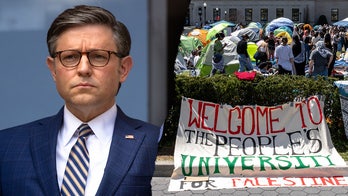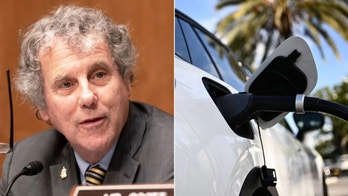President Obama, in Cleveland to deliver an aggressive campaign-style speech, urged voters not to buy the economic plan Republicans are selling, casting the upcoming election as one of "fear versus hope."
The president, facing down low approval ratings and political projections that show Republicans making big gains in November, tried to shake things up in the middle of his new economic push. He was pitching a three-point proposal that involves billions in new spending and tax cuts but the address was far from a policy speech.
The president toggled between telling anecdotes about his family history and hitting hard -- very hard -- at House Republican Leader John Boehner. Calling out the GOP leader by name, he ridiculed an economic speech Boehner gave in Cleveland last month, saying the Ohio Republican has offered "no new policies" and "no new ideas."
"The easiest thing for the other side to do is to ride this fear and anger all the way to the election," Obama said. "A lot has changed since I came here in those final days of the last election, but what hasn't is the choice facing this country. It's still fear versus hope, the past versus the future. It's still a choice between sliding backward and moving forward."
Boehner has questioned why the president is singling him out when he has more pressing matters to attend to. Offering a couple unique ideas Wednesday, he called for the government to enact a two-year tax rate freeze and return to fiscal 2008 spending levels as they were before the "bailouts, government takeovers and 'stimulus' spending sprees.'"
The president, though, is speaking with a fresh sense of urgency about his economic vision for the country, faced with the possibility that a Republican surge in Congress could stop that vision in its tracks.
He pledged to support extending the Bush tax cuts for the middle class but rejected Republican calls to extend them for the top tier of wage-earners. He said the across-the-board extension would have a limited impact on the economy and cost too much to implement.
"We should not hold middle class tax cuts hostage any longer. We are ready, this week, if they want, to give tax cuts to every American making $250,000 or less," Obama declared.
Obama also tapped into his own family history Wednesday, trying to connect with the hardships American families face by retelling the struggles his parents and grandparents endured to build a better life for him.
"Michelle and I are where we are today because even though our families didn't have much, they worked tirelessly -- without complaint -- so that we might have a better life," Obama said. "My grandfather marched off to Europe in World War II and my grandmother worked in factories on the home front. I had a single mom who put herself through school, and would wake before dawn to make sure I got a decent education."
Obama conveyed his wife Michelle's childhood memories about her Multiple Sclerosis-stricken father heading out to work even though he had to use crutches. He said his belief in and vision for a strong middle class inspired him to become a community organizer on the south side of Chicago and ultimately run for president.
Aides said before the address that Obama would start adding more of his personal backstory as he takes his proposals on the road.
Obama is on the road to both build confidence in congressional Democrats and support for a $180 billion set of new economic proposals. They include a $50 billion infrastructure investment, a $100 billion permanent extension of the research and development business tax credit and a tax break for capital investments said to cost about $30 billion net over the next decade.
Obama was in Milwaukee Monday for Labor Day. He's holding a press conference in Washington, D.C., on Friday.
The president acknowledged Wednesday that the economic recovery has not taken off to the degree many had hoped and urged the country to give Democrats more time. He's been hammering the argument that Americans are better off than they were under the Bush administration but is still trying to restore the economy to where it was before the recession moved into full swing toward the end of George W. Bush's presidency.
The unemployment rate hit 9.6 percent in August -- it was 6.1 percent two years before that. The national debt has also topped $13 trillion -- two years ago, it was at about $10 trillion.
The fiscal picture has some members of Obama's own party nervous about his latest proposals. Sen. Michael Bennet, D-Colo., said he won't support any new deficit spending.
"I will not support additional spending in a second stimulus package. Any new transportation initiatives can be funded through the Recovery Act, which still contains unused funds," he said. "Public-private partnerships that improve our infrastructure are a good idea, but must be paid for, should not add a dime to the deficit, and should be covered by unused Recovery Act dollars. We must make hard choices to significantly reduce the deficit."
Republicans continued to slam the president for endorsing a limited extension of the Bush tax cuts, which they say will hurt small businesses. Senate Minority Leader Mitch McConnell released a statement calling for Obama to make a "declarative statement" against such tax hikes.
"If the president wanted to have an immediate impact on hiring, he could begin by changing his mind and announcing today his opposition to the job-killing tax hikes on small businesses," he said.
Boehner also said the president has better things to do than go after his statements.
"The American people are asking the question, 'where are the jobs?' and yet here's the White House worrying about what I've got to say," he said in an interview on ABC's "Good Morning America."




